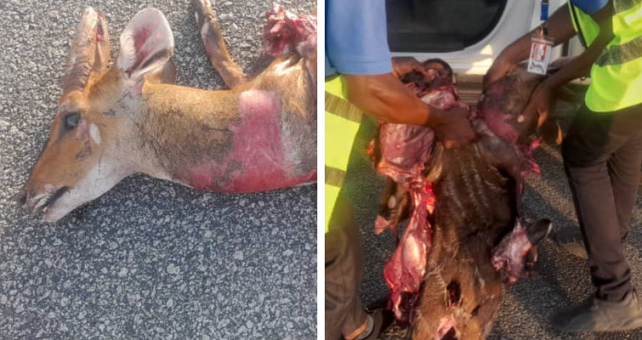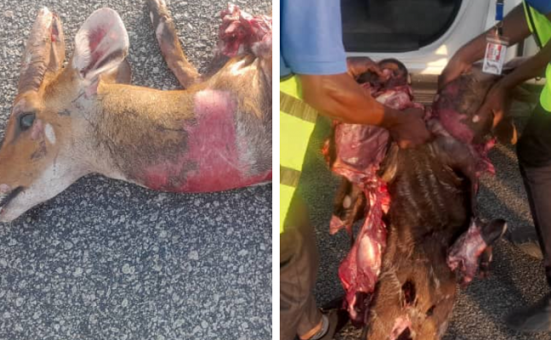The Nigeria Civil Aviation Authority (NCAA) is currently facing widespread criticism from aviation professionals and stakeholders following a disturbing incident on Saturday involving a collision between a large antelope and an Air Peace aircraft on the runway of the Asaba International Airport, Delta State.
Eyewitness accounts and visual evidence from the scene revealed that the animal was fatally struck during the aircraft’s taxiing phase, leaving the aircraft temporarily grounded due to safety concerns. Graphic images circulating on social media showed blood stains smeared across the undercarriage of the aircraft, while aviation engineers were promptly dispatched to inspect and assess the extent of damage caused.
Spokesperson for the NCAA, Mr. Michael Achimugu, confirmed the occurrence and acknowledged that the affected flight had to be suspended, inevitably disrupting the airline’s operational schedule. He, however, emphasized that while the event was beyond the control of the airline, Air Peace was still obligated under current regulations to inform passengers, process refunds where applicable, and provide necessary care and compensation to affected customers. Failure to comply, he added, could still attract regulatory sanctions.
“This is a clear example of how flight delays or cancellations are sometimes not the fault of airlines,” Mr. Achimugu stated, while reiterating that standard passenger rights must still be upheld regardless of the cause of the disruption.
However, the incident has triggered broader concerns about aviation safety and regulatory oversight in Nigeria. Industry experts have described the event as a failure in airport security protocol, particularly regarding the presence and integrity of perimeter fencing—a fundamental requirement under international aviation safety standards set by the International Civil Aviation Organization (ICAO).
Veteran aviation analyst and retired Group Captain John Ojikutu expressed strong disapproval, insisting that the Federal Airports Authority of Nigeria (FAAN) or the relevant airport operators must bear responsibility for the lapse. Although Asaba Airport is managed by the Delta State government and not FAAN, Ojikutu maintained that all airports within the Nigerian airspace must adhere to NCAA regulations irrespective of their administrative control.
“Do these airports have actual security fencing or just perimeter fencing for show? An audit was done last year—what were the results? Are we meeting ICAO safety standards at all?” Ojikutu asked pointedly. He further noted that this was not the first time such a breach had occurred, citing a similar episode in Port Harcourt, and expressed frustration over the aviation authority’s failure to implement his longstanding recommendation for mandatory airport insurance.
“The Civil Aviation Act of 2022 makes no explicit provision for airport insurance, which is regrettable. Previously, airports were insured, and they still should be. If that aircraft suffered any damage, Air Peace has every right to seek compensation from the airport authorities,” he asserted.
Echoing similar sentiments, retired Nigeria Airways pilot Captain Muhammed Badamasi stressed the necessity of fencing around airport perimeters to prevent wildlife and unauthorized persons from gaining access to critical areas such as runways and taxiways. He added that enforcing these measures falls squarely within the jurisdiction of the NCAA.
“Whether FAAN is in charge or the state government runs the airport, every facility and personnel must function under the rules established by the NCAA. There’s no room for laxity when safety is involved,” Badamasi noted.
The Asaba Airport incident has rekindled conversations about aviation infrastructure, safety enforcement, and the readiness of Nigeria’s domestic airports to handle increasing air traffic while complying with global aviation standards. With the NCAA and other regulatory bodies now under pressure, stakeholders await decisive action to prevent a recurrence of such avoidable threats to passenger and aircraft safety.

